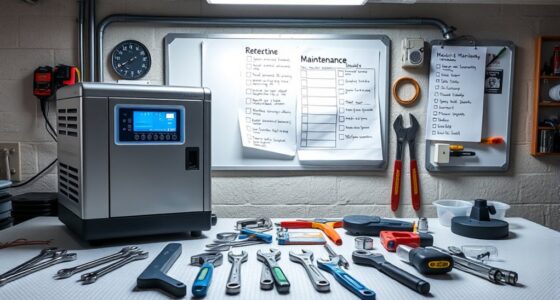To guarantee your startup passes all codes and compliance, you need to understand your local licensing requirements and industry-specific standards. Develop a detailed testing plan early, keep thorough documentation, and stay updated on changing regulations. Educate your team on responsibilities, use checklists to track progress, and plan for ongoing monitoring after launch. Following these rules helps prevent legal issues and makes your business more resilient—if you want to uncover all the secrets, keep going.
Key Takeaways
- Understand and comply with local licensing, permits, and industry-specific regulations before testing.
- Develop detailed testing plans with clear objectives, responsibilities, and timelines for effective management.
- Engage certified professionals for expert assessments to ensure adherence to standards and reduce compliance risks.
- Maintain organized documentation and prepare for inspections through regular reviews and mock audits.
- Educate your team on compliance procedures and use checklists to track testing milestones and ensure accountability.
Understand the Importance of Local Licensing Requirements

Understanding local licensing requirements is essential because they directly impact how you legally operate your startup. Without proper licensing, you risk fines, shutdowns, or legal trouble. Local licensing covers permits and licenses specific to your city, county,, or state, and these licensing requirements vary widely depending on your industry and location. It’s your responsibility to research and ensure you meet all the necessary criteria before launching. Failing to comply can delay your startup’s growth or even force you to shut down. Take the time to understand the licensing process in your area, gather all required documents, and submit your applications correctly. Staying compliant from the start protects your business and sets a strong foundation for future success. Additionally, understanding legal and financial matters can help you navigate complex regulations and avoid costly mistakes.
Know Your Industry’s Specific Standards and Regulations

Understanding your industry’s specific standards and regulations is vital to guarantee compliance and avoid fines. You need to review regulatory frameworks, obtain necessary certifications, and keep detailed documentation. Staying informed helps you meet legal requirements and build trust with your customers and partners. Additionally, being aware of market volatility can help you adapt your compliance strategies accordingly.
Regulatory Frameworks Overview
Before launching your startup, it’s crucial to familiarize yourself with the specific standards and regulations that govern your industry. These frameworks ensure compliance and help you avoid costly setbacks. Regulations often address environmental impact, requiring sustainable practices that minimize harm. Patent considerations are also critical to protect your innovations and avoid infringement issues. Understanding these frameworks helps you streamline product development and market entry.
- Research industry-specific environmental regulations
- Protect your intellectual property through patents
- Stay updated on evolving compliance standards
Industry-Specific Certification
Are you aware of the industry-specific certifications required to legally and confidently operate your startup? Knowing your industry’s specific standards is essential for compliance and market trust. Each sector has unique certification processes that validate your products or services meet safety, quality, and regulatory requirements. For instance, tech startups may need ISO certifications, while food businesses require FDA approval or HACCP standards. Understanding these industry-specific standards helps prevent costly delays and legal issues. Research the exact certifications your industry mandates and guarantee your team is prepared for the application process. Getting certified not only demonstrates your commitment to quality but also builds credibility with customers and partners. Stay proactive—knowing and completing the right certification processes is a critical step toward sustainable success.
Compliance Documentation Tips
Knowing your industry’s specific standards and regulations is essential for creating accurate and complete compliance documentation. Proper documentation management guarantees you meet legal requirements and supports effective risk assessment. To stay compliant, focus on these key tips:
- Keep detailed records of all testing procedures and results to demonstrate compliance.
- Regularly review and update documentation to reflect regulatory changes.
- Organize files systematically for quick access during audits or inspections.
- Incorporating effective anti-aging ingredients like collagen and hyaluronic acid can enhance the credibility and thoroughness of your documentation.
Develop a Comprehensive Testing Plan Early On

Developing a thorough testing plan early guarantees your startup can identify potential issues before they become major setbacks. A solid plan ensures you prioritize quality assurance, preventing costly mistakes later. Start by defining clear testing objectives aligned with your product’s goals and compliance standards. Incorporate risk management strategies to pinpoint vulnerabilities and address them proactively. Establish testing timelines, assign responsibilities, and select appropriate methods to cover all critical areas. This proactive approach allows you to catch bugs early, optimize resources, and meet regulatory requirements efficiently. Remember, the earlier you plan your testing processes, the better you can adapt to unforeseen challenges, ensuring a smoother launch and a more reliable product. Effective planning enhances overall quality assurance and helps maintain compliance standards. Prioritize early planning to conserve time, money, and reputation.
Keep Detailed Documentation of All Testing Processes

Keeping detailed documentation of all testing processes is essential for tracking progress, identifying recurring issues, and ensuring accountability. Proper documentation management helps you maintain clear records of testing protocols, making it easier to review and refine procedures. By documenting each step, you can quickly pinpoint where failures occur and prevent future mistakes. Consistent records also streamline audits and regulatory reviews, saving you time and effort. To effectively manage your testing documentation, consider these key points:
- Maintain organized records of testing protocols and results
- Record issues, fixes, and updates promptly
- Use standardized templates to guarantee consistency
- Incorporate cookie categories to ensure compliance with privacy regulations
This approach keeps your testing processes transparent and manageable, helping you stay compliant and improve your product efficiently.
Stay Up-To-Date With Changing Codes and Compliance Rules

Accurate documentation of testing processes makes it easier to stay aligned with current standards, but regulations and codes are constantly evolving. To keep pace, you need to actively monitor regulatory updates relevant to your industry and jurisdiction. Regularly reviewing official sources, such as government websites and industry associations, helps you catch changes early. Additionally, investing in compliance training ensures your team understands new requirements and implements them correctly. Staying current with these updates minimizes risks of non-compliance and testing failures. Create a system for tracking regulatory changes and setting reminders for training sessions. Incorporating Hackathons into your learning and innovation strategies can also provide practical, hands-on experience with new technologies and compliance challenges in a collaborative environment. By proactively managing these updates, you’ll maintain your startup’s credibility and avoid costly penalties, making sure your testing processes remain compliant and effective in an ever-changing regulatory landscape.
Engage With Certified Professionals for Critical Assessments

Working with certified professionals guarantees your startup’s critical assessments meet industry standards and regulations. It is crucial to choose qualified assessors who have the expertise to identify potential issues early. Their evaluations help you stay compliant and avoid costly mistakes down the line. Additionally, leveraging essential resources and tips for caregivers and seniors can provide valuable insights into maintaining a safe and compliant environment.
Importance of Expert Evaluation
Engaging with certified professionals is indispensable when conducting critical assessments of your startup. Their expert insights help identify potential pitfalls and validate your compliance strategies. Relying on industry feedback ensures your testing approaches align with current standards and best practices. By consulting experts, you gain objective perspectives that can uncover overlooked issues, saving you time and resources. Incorporating energetic alignment into your evaluation process can further enhance the accuracy and effectiveness of your assessments.
- Gain nuanced understanding of complex regulations
- Receive tailored recommendations based on industry standards
- Validate your testing processes with credible expertise
Partnering with certified professionals not only boosts your confidence but also enhances your credibility with regulators and investors. Their evaluation provides a solid foundation for compliance, helping you navigate risks more effectively. Ultimately, expert evaluation is a crucial step toward building a compliant, trustworthy startup.
Selecting Qualified Assessors
Choosing the right assessors is crucial to guaranteeing your startup’s essential evaluations are credible and effective. When selecting professionals for risk assessment, focus on their qualifications and experience in your industry. Qualified assessors understand the nuances of your sector and can accurately identify potential hazards. Look for certifications and proven track records in conducting thorough evaluations. Their expertise ensures that every aspect of your testing process is reliable, reducing errors and overlooked risks. Don’t compromise on assessor qualifications, as subpar assessments can lead to costly compliance issues later. Engage with certified professionals who demonstrate a clear understanding of testing standards and safety protocols. Properly qualified assessors are your best asset in building a solid foundation for regulatory adherence and operational success. Additionally, leveraging vetted experts ensures that your testing procedures meet industry standards and are trusted by regulatory bodies.
Ensuring Regulatory Compliance
To guarantee your startup stays compliant with industry regulations, partnering with certified professionals for critical assessments is essential. They can help verify that your product labeling meets legal standards and enhances consumer safety. Proper assessments ensure your products align with regulatory requirements, reducing legal risks and building trust with customers. When engaging experts, focus on key areas like accurate product labeling, safety testing, and documentation. Additionally, utilizing compliance tools can streamline the process and ensure thorough adherence to standards.
Implement Quality Control Measures Throughout Development

Implementing quality control measures throughout development is essential to catching issues early and ensuring your product meets standards. Focusing on quality assurance helps you systematically verify that each stage aligns with your requirements, reducing the risk of defects later. By integrating defect prevention strategies, you can identify potential problems before they escalate, saving time and resources. Establish clear testing protocols and regular reviews to monitor progress continuously. Automated tests and peer reviews are effective tools to maintain consistency and catch errors early. Remember, proactive quality control not only improves product reliability but also builds customer trust. Staying vigilant throughout development ensures you deliver a compliant, high-quality product that meets regulatory expectations and minimizes costly revisions.
Prepare for Regular Inspections and Audits

To stay prepared for inspections and audits, you need to set clear schedules and keep track of upcoming dates. Maintaining thorough documentation guarantees everything is accessible and organized, making audits smoother. Training your team on compliance standards helps everyone stay aligned and ready for review at any time.
Schedule Inspection Timelines
How can you assure your startup stays compliant and ready for inspections? The key is effective inspection scheduling and strict timeline management. You need to set clear, recurring dates for audits and adhere to them consistently. This proactive approach helps you avoid last-minute surprises and ensures ongoing compliance.
To do this, consider:
- Creating a detailed calendar for all upcoming inspections and audits
- Assigning responsible team members for each scheduled task
- Regularly reviewing and adjusting your timeline to accommodate changes
Maintain Documentation Standards
Maintaining consistent documentation standards is essential for passing inspections and audits without issues. Follow documentation best practices to guarantee all records are accurate, complete, and up-to-date. Use clear, organized record keeping strategies that make it easy to locate key information quickly. Regularly review your documentation to identify gaps or inconsistencies, and correct them promptly. Keep electronic and paper files secure and backed up, adhering to industry standards. Proper documentation shows compliance and demonstrates your commitment to safety and quality. Establish a routine for updating files, labeling records clearly, and maintaining version control. Staying disciplined with record keeping strategies reduces the risk of missing critical information during inspections and helps you demonstrate compliance confidently.
Train for Compliance Checks
Preparing your team for compliance checks is vital to guarantee smooth inspections and audits. Proper employee training ensures everyone understands safety protocols and company policies, reducing violations and delays. Regular training sessions keep staff updated on evolving regulations, making compliance second nature. It’s essential to:
- Conduct mock inspections to identify gaps and reinforce procedures
- Review safety protocols regularly to ensure familiarity and adherence
- Keep training records current to demonstrate ongoing compliance efforts
Maintain Clear Records for Legal and Certification Purposes

Keeping detailed and organized records is essential to guarantee your startup stays compliant with legal and certification requirements. Proper record archiving ensures you can quickly retrieve critical documentation, such as test results, certifications, and technical jargon, when needed. Clear records help demonstrate compliance during audits and inspections, reducing legal risks. Use systematic labeling and digital storage to maintain accuracy and accessibility. Regularly update your files to reflect the latest certifications and test data. This disciplined approach not only safeguards your legal standing but also streamlines troubleshooting and future audits. Remember, incomplete or disorganized records can lead to costly delays or penalties. Prioritize meticulous record keeping as a core part of your compliance strategy to keep your startup running smoothly and within legal boundaries.
Educate Your Team on Compliance Procedures and Responsibilities

Educating your team on compliance procedures and responsibilities is crucial to guarantee everyone understands their role in maintaining regulatory standards. Effective team communication is essential to ensure compliance training is clear and actionable. When your team understands the rules, they can identify potential issues early and act accordingly. Incorporate regular training sessions to reinforce compliance principles and update everyone on new regulations. Use practical examples to make procedures memorable and relevant. Encourage questions to clarify uncertainties and foster a culture of accountability. Remember, well-informed team members are your best asset for ensuring ongoing compliance. Focus on clear, consistent communication, and make compliance a shared priority. This approach minimizes errors and builds a strong foundation for regulatory success.
Use Checklists to Track Testing Milestones and Deadlines

Using checklists to track testing milestones and deadlines helps you stay organized and makes certain critical tasks aren’t overlooked. By clearly outlining each testing milestone, you ensure your team stays on schedule and progresses efficiently. Checklists enable effective deadline tracking, so you can identify potential delays early and adjust plans accordingly. This system keeps everyone accountable and aware of upcoming tasks, reducing the risk of missed deadlines. Regularly updating your checklists guarantees you maintain an accurate overview of your testing progress. With a structured approach to milestone management and deadline tracking, you’ll improve overall testing efficiency and increase confidence that all requirements are met on time. This proactive method minimizes surprises and keeps your startup moving smoothly toward launch.
Plan for Post-Launch Monitoring and Continuous Improvement

Planning for post-launch monitoring and continuous improvement is crucial to guarantee your startup maintains quality and adapts to user needs. You need a clear strategy to analyze post launch analytics and gather customer feedback regularly. This helps you spot issues early and identify opportunities for enhancement. Focus on setting up tools that track key performance metrics, customer satisfaction, and usage patterns. Regularly review this data to inform your product updates and service adjustments. Keep communication channels open for customer feedback, ensuring users feel heard. Your goal is to create a cycle of ongoing improvement that keeps your startup competitive and aligned with user expectations. By staying proactive, you’ll ensure your product evolves effectively, maintaining quality and fostering growth.
Frequently Asked Questions
How Do I Prioritize Testing Tasks Across Different Regulatory Areas?
You should start by conducting a risk assessment to identify the most critical regulatory areas affecting your startup. Engage stakeholders early to understand their concerns and priorities. Prioritize testing tasks with the highest potential impact and compliance risks, then allocate resources accordingly. Regularly review and adjust your plan based on new insights and stakeholder feedback, ensuring you address the most pressing regulatory issues first for smoother compliance and reduced legal risks.
What Are Common Pitfalls in Startup Testing Compliance?
You often face regulatory delays and testing oversights that can derail your startup’s progress. Common pitfalls include neglecting early compliance checks, which lead to costly delays later. You might also overlook specific testing requirements for different regulatory areas, resulting in non-compliance. To avoid these issues, stay proactive, document thoroughly, and regularly review your testing processes. This approach helps you identify potential pitfalls early, keeping your startup compliant and on track.
How Often Should Testing Processes Be Reviewed and Updated?
Think of your testing processes as a garden needing regular tending. You should review and update your testing automation and quality assurance procedures at least quarterly, or whenever major changes occur in your product or regulations. Staying proactive guarantees your testing stays sharp, reducing risks and maintaining compliance. Regular reviews help you catch issues early, keep your processes aligned with industry standards, and foster continuous improvement.
What Tools Can Streamline Compliance Documentation?
You can streamline compliance documentation by leveraging regulatory automation tools that simplify tracking and updating requirements. Using documentation templates saves time and guarantees consistency across reports. These tools help you automate routine tasks, reduce errors, and maintain up-to-date records effortlessly. By integrating regulatory automation and well-designed templates into your process, you stay compliant efficiently, freeing you to focus on core business growth and innovation.
How Can Startups Effectively Manage Compliance Costs?
Managing compliance costs is like steering a ship through choppy waters—you need a clear plan. You should conduct regular risk assessments to identify areas where costs could spiral and involve stakeholders early to align expectations. By prioritizing compliance tasks and using automation tools, you minimize unnecessary expenses. This proactive approach helps you stay afloat without sinking your budget, ensuring you meet regulations while controlling costs effectively.
Conclusion
By following these 12 rules, you’ll confidently navigate startup testing, avoiding costly delays or legal setbacks. Some might think compliance slows down progress, but in reality, it keeps your project on track and builds trust with customers and regulators. Embrace these practices early, and you’ll create a solid foundation for success. Remember, thorough testing and adherence to codes aren’t just legalities—they’re your keys to sustainable growth and peace of mind.









